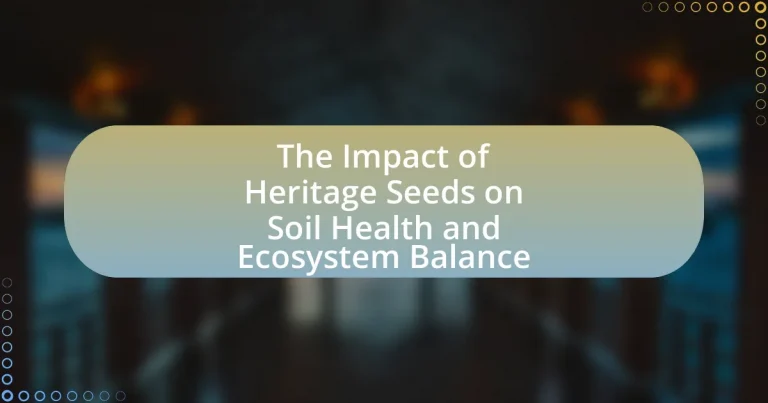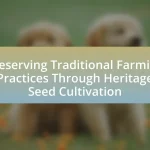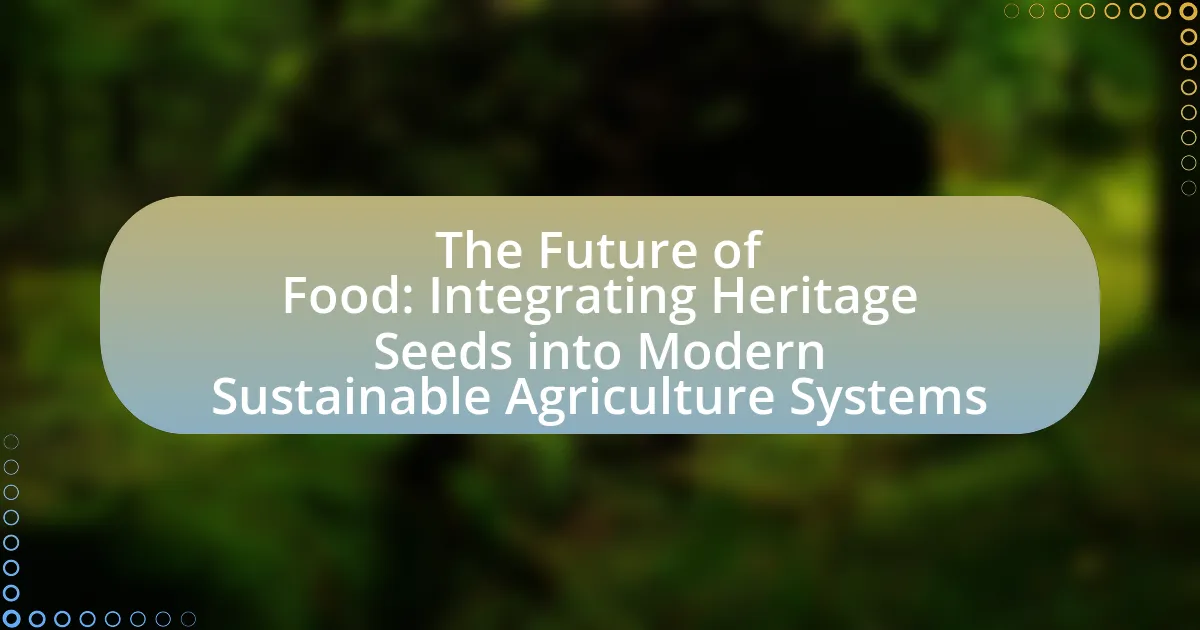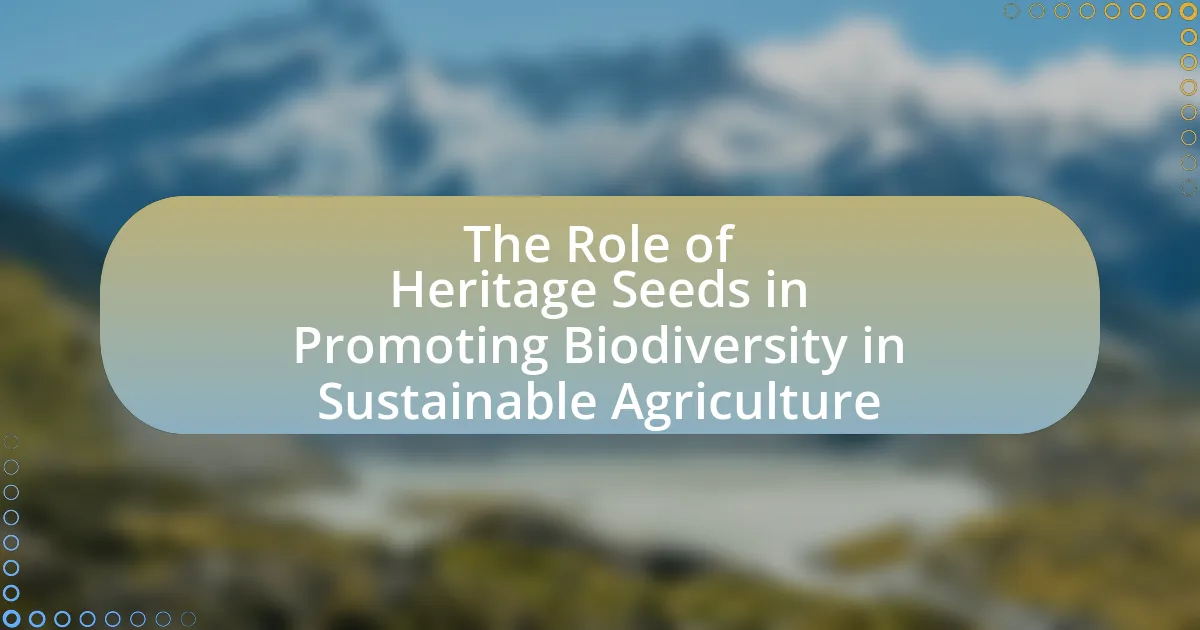Heritage seeds are traditional seed varieties that have been cultivated for generations, known for their adaptability, resilience, and genetic diversity. This article explores the significant role of heritage seeds in enhancing soil health and promoting ecosystem balance. It examines how these seeds differ from hybrid and GMO varieties, their historical significance, and their impact on biodiversity, soil structure, and microbial communities. Additionally, the article discusses practical steps for farmers to incorporate heritage seeds into sustainable agricultural practices, highlighting their ecological benefits, including support for pollinator populations and local wildlife habitats.

What are Heritage Seeds and Their Role in Agriculture?
Heritage seeds are traditional seed varieties that have been passed down through generations, often characterized by their adaptability, resilience, and genetic diversity. These seeds play a crucial role in agriculture by promoting biodiversity, which enhances soil health and ecosystem balance. Research indicates that heritage seeds can improve soil structure and fertility due to their deep root systems and ability to thrive in diverse conditions, thereby reducing the need for chemical fertilizers. Additionally, the cultivation of heritage seeds supports local food systems and preserves agricultural heritage, contributing to sustainable farming practices.
How do Heritage Seeds differ from Hybrid and GMO Seeds?
Heritage seeds differ from hybrid and GMO seeds primarily in their breeding methods and genetic stability. Heritage seeds are open-pollinated varieties that have been passed down through generations, maintaining their genetic traits over time, while hybrid seeds result from controlled crossbreeding of two different parent plants to produce specific traits, and GMO seeds are genetically modified organisms that have been altered at the DNA level to express desired characteristics. Heritage seeds often exhibit greater biodiversity and adaptability to local conditions, which can enhance soil health and ecosystem balance, as evidenced by studies showing that diverse plant varieties contribute to improved soil structure and nutrient cycling.
What characteristics define Heritage Seeds?
Heritage seeds are defined by their open-pollinated nature, which allows them to be naturally pollinated and produce seeds that are true to type. These seeds are typically heirloom varieties, meaning they have been passed down through generations, often for at least 50 years, and are valued for their genetic diversity, adaptability to local conditions, and unique flavors. Heritage seeds contribute to biodiversity and resilience in ecosystems, as they are well-suited to specific environments and can thrive without the need for synthetic fertilizers or pesticides. This adaptability is supported by historical cultivation practices that have selected for traits beneficial to local soil health and ecosystem balance.
Why are Heritage Seeds important for biodiversity?
Heritage seeds are important for biodiversity because they preserve genetic diversity within plant species, which is crucial for ecosystem resilience. By maintaining a wide variety of plant genetics, heritage seeds contribute to the adaptability of crops to changing environmental conditions, pests, and diseases. For instance, studies have shown that diverse plant populations can better withstand climate fluctuations, thereby supporting overall ecosystem stability and health. Additionally, heritage seeds often have traits that are lost in modern hybrids, such as drought resistance or unique flavors, which can enhance agricultural biodiversity and food security.
What historical significance do Heritage Seeds hold?
Heritage seeds hold historical significance as they represent traditional agricultural practices and biodiversity, having been cultivated for generations. These seeds are often heirlooms, passed down through families and communities, preserving unique genetic traits that contribute to food security and resilience against pests and diseases. For example, many heritage varieties were developed before the advent of modern hybridization and genetic modification, thus maintaining a genetic diversity that is crucial for adapting to changing environmental conditions. This historical context underscores their role in sustainable agriculture and ecosystem balance, as they support soil health through diverse planting and crop rotation practices.
How have Heritage Seeds been used throughout history?
Heritage seeds have been used throughout history primarily for their ability to adapt to local climates and conditions, ensuring food security and agricultural diversity. Historically, these seeds were cultivated by indigenous and local communities, who selected them for their resilience, flavor, and nutritional value. For example, heritage varieties of crops like corn, beans, and tomatoes have been passed down through generations, preserving genetic diversity that modern hybrids often lack. This genetic diversity is crucial for maintaining soil health and ecosystem balance, as it supports a wider range of beneficial organisms and reduces vulnerability to pests and diseases.
What cultural practices are associated with Heritage Seeds?
Cultural practices associated with Heritage Seeds include seed saving, crop rotation, and organic farming methods. Seed saving allows farmers to preserve and propagate traditional varieties, maintaining genetic diversity and resilience. Crop rotation enhances soil health by preventing nutrient depletion and reducing pest and disease cycles. Organic farming methods, which often accompany Heritage Seeds, promote sustainable practices that improve soil structure and biodiversity, contributing to a balanced ecosystem. These practices are rooted in historical agricultural traditions that prioritize environmental stewardship and community resilience.

How do Heritage Seeds Impact Soil Health?
Heritage seeds positively impact soil health by promoting biodiversity and enhancing soil structure. These seeds, which are open-pollinated and adapted to local conditions, contribute to a diverse ecosystem that supports beneficial microorganisms. Research indicates that increased plant diversity from heritage seeds leads to improved soil organic matter and nutrient cycling, which are crucial for maintaining soil fertility. For example, a study published in the journal “Agriculture, Ecosystems & Environment” found that diverse cropping systems, including those using heritage seeds, significantly increased soil microbial biomass and activity, thereby enhancing overall soil health.
What benefits do Heritage Seeds provide to soil structure?
Heritage seeds enhance soil structure by promoting biodiversity and improving soil health. The diverse root systems of heritage plants create channels in the soil, which increases aeration and water infiltration. Additionally, these plants contribute organic matter through their decaying roots and leaves, enriching the soil with nutrients. Research indicates that diverse cropping systems, including heritage varieties, can lead to improved soil aggregation and stability, which are crucial for preventing erosion and maintaining soil fertility.
How do Heritage Seeds contribute to soil fertility?
Heritage seeds contribute to soil fertility by promoting biodiversity and enhancing soil structure. These seeds are often adapted to local conditions, which allows them to thrive without the need for synthetic fertilizers. As a result, they support a diverse range of microorganisms in the soil, which play a crucial role in nutrient cycling and organic matter decomposition. Research indicates that diverse plant species, such as those grown from heritage seeds, can improve soil health by increasing microbial activity and enhancing nutrient availability, ultimately leading to more fertile soil.
What role do Heritage Seeds play in preventing soil erosion?
Heritage seeds play a crucial role in preventing soil erosion by promoting biodiversity and enhancing soil structure. These seeds, which are traditional varieties that have been passed down through generations, often have deep root systems that stabilize the soil and reduce the risk of erosion caused by wind and water. Research indicates that diverse plant communities, which heritage seeds contribute to, improve soil health by increasing organic matter and promoting beneficial microbial activity, further reinforcing soil integrity. Studies have shown that fields planted with heritage varieties can reduce soil erosion rates by up to 50% compared to monoculture systems, demonstrating their effectiveness in maintaining soil stability and health.
How do Heritage Seeds affect soil microbial communities?
Heritage seeds positively affect soil microbial communities by promoting biodiversity and enhancing soil health. These seeds, often derived from traditional varieties, are adapted to local conditions and contribute to a more diverse plant ecosystem, which in turn supports a wider range of soil microorganisms. Research indicates that increased plant diversity from heritage seeds leads to improved microbial diversity, as different plants provide various root exudates that serve as food sources for different microbial species. A study published in the journal “Soil Biology and Biochemistry” found that fields planted with heritage varieties exhibited higher microbial biomass and activity compared to those with monocultures, demonstrating the beneficial impact of heritage seeds on soil microbial communities.
What types of microorganisms thrive in soils with Heritage Seeds?
Soils with Heritage Seeds support a diverse range of microorganisms, including beneficial bacteria, fungi, and protozoa. These microorganisms play crucial roles in nutrient cycling, soil structure improvement, and plant health. For instance, specific bacteria such as Rhizobium form symbiotic relationships with legumes, enhancing nitrogen availability in the soil. Additionally, mycorrhizal fungi associate with plant roots, facilitating nutrient uptake and improving drought resistance. Research indicates that the use of Heritage Seeds promotes microbial diversity, which is essential for maintaining soil health and ecosystem balance.
How do these microorganisms enhance soil health?
Microorganisms enhance soil health by improving nutrient cycling, increasing soil structure, and promoting plant growth. These microorganisms, including bacteria and fungi, decompose organic matter, releasing essential nutrients like nitrogen and phosphorus, which are vital for plant development. Additionally, they form symbiotic relationships with plant roots, such as mycorrhizal associations, which enhance water and nutrient uptake. Research indicates that soils rich in microbial diversity exhibit greater resilience and fertility, supporting sustainable agricultural practices and ecosystem balance.

What is the Relationship Between Heritage Seeds and Ecosystem Balance?
Heritage seeds contribute positively to ecosystem balance by promoting biodiversity and resilience in agricultural systems. These seeds, which are open-pollinated and often heirloom varieties, support a wider range of plant species, which in turn attracts diverse pollinators and beneficial insects. Research indicates that farms utilizing heritage seeds can enhance soil health through improved microbial activity and nutrient cycling, leading to more sustainable farming practices. For example, a study published in the journal “Agriculture, Ecosystems & Environment” found that diverse cropping systems, including those with heritage seeds, can reduce pest outbreaks and improve overall ecosystem stability.
How do Heritage Seeds promote biodiversity in ecosystems?
Heritage seeds promote biodiversity in ecosystems by preserving a wide variety of plant genetic resources that contribute to ecological resilience. These seeds are often heirloom varieties, which have adapted to local conditions over generations, thus supporting diverse plant communities and enhancing soil health. Research indicates that diverse plant species can improve ecosystem functions such as nutrient cycling and pest resistance, leading to more stable and productive environments. For example, a study published in the journal “Agriculture, Ecosystems & Environment” found that farms utilizing heritage seeds exhibited greater species richness and improved soil structure compared to monoculture systems. This diversity not only supports wildlife habitats but also fosters a more balanced ecosystem overall.
What specific plant and animal interactions are influenced by Heritage Seeds?
Heritage seeds influence specific plant and animal interactions by promoting biodiversity and enhancing ecosystem resilience. These seeds often yield heirloom varieties that attract a wider range of pollinators, such as bees and butterflies, which are essential for the reproduction of many flowering plants. Additionally, heritage crops can support various herbivores, including insects and small mammals, by providing diverse food sources. Research indicates that diverse plant communities foster beneficial relationships with soil organisms, such as mycorrhizal fungi, which improve nutrient uptake for plants and enhance soil health. This interconnectedness illustrates how heritage seeds contribute to a balanced ecosystem by facilitating interactions among plants, animals, and microorganisms.
How do Heritage Seeds contribute to pest and disease resistance in ecosystems?
Heritage seeds contribute to pest and disease resistance in ecosystems by promoting genetic diversity, which enhances resilience against specific pests and diseases. This genetic variation allows plants to adapt to local environmental conditions and pressures, reducing the likelihood of widespread crop failure. Studies have shown that diverse plant populations can better withstand pest infestations and disease outbreaks compared to monocultures, as seen in research conducted by the University of California, which found that diverse crop systems reduced pest populations by up to 50%. Additionally, heritage seeds often possess traits that have evolved over generations, such as natural resistance mechanisms, which further bolster their ability to thrive in challenging conditions.
What are the ecological benefits of using Heritage Seeds in farming?
Heritage seeds provide significant ecological benefits in farming by promoting biodiversity and enhancing soil health. These seeds are often more resilient to local pests and diseases, reducing the need for chemical pesticides, which can harm surrounding ecosystems. Additionally, heritage seeds contribute to soil fertility through their deep root systems, which improve soil structure and increase organic matter. Research indicates that diverse cropping systems, including those utilizing heritage seeds, can lead to improved ecosystem services such as pollination and nutrient cycling, ultimately supporting a more balanced agricultural environment.
How do Heritage Seeds support pollinator populations?
Heritage seeds support pollinator populations by promoting biodiversity and providing a variety of flowering plants that attract and sustain pollinators. These seeds often produce heirloom varieties that have not been genetically modified, ensuring that they retain the natural traits necessary for pollinator attraction, such as nectar and pollen availability. Research indicates that diverse plantings, including those from heritage seeds, can enhance habitat quality for pollinators, leading to increased populations and improved ecosystem services. For example, studies have shown that farms utilizing heritage seeds can support higher numbers of native bee species compared to monoculture systems, thereby reinforcing the importance of these seeds in maintaining healthy pollinator communities.
What impact do Heritage Seeds have on local wildlife habitats?
Heritage seeds positively impact local wildlife habitats by promoting biodiversity and supporting ecosystem resilience. These seeds are often heirloom varieties that have adapted to local conditions over generations, providing food and habitat for various species. Research indicates that diverse plant communities, which heritage seeds contribute to, enhance habitat complexity, offering shelter and resources for insects, birds, and other wildlife. For instance, a study published in the journal “Biodiversity and Conservation” highlights that agricultural practices incorporating heritage seeds can lead to increased populations of pollinators and beneficial insects, which are crucial for ecosystem health.
What practical steps can farmers take to incorporate Heritage Seeds?
Farmers can incorporate Heritage Seeds by selecting and sourcing seeds from local seed banks or heritage seed organizations that specialize in traditional varieties. This practice ensures genetic diversity and adaptation to local conditions. Additionally, farmers should engage in seed saving, which involves collecting seeds from their best-performing plants each season, thereby promoting resilience and sustainability in their crops. Implementing crop rotation with Heritage Seeds can enhance soil health by improving nutrient cycling and reducing pest pressures. Research indicates that using Heritage Seeds can lead to improved soil structure and biodiversity, which are crucial for ecosystem balance.
What are the best practices for growing Heritage Seeds sustainably?
The best practices for growing Heritage Seeds sustainably include selecting locally adapted varieties, practicing crop rotation, and utilizing organic farming methods. Selecting locally adapted varieties ensures that the seeds are well-suited to the local climate and soil conditions, which enhances resilience and reduces the need for chemical inputs. Crop rotation helps maintain soil fertility and disrupts pest and disease cycles, promoting a balanced ecosystem. Organic farming methods, such as composting and natural pest control, further support soil health and biodiversity. Research indicates that these practices contribute to improved soil structure and nutrient availability, ultimately benefiting both the crops and the surrounding ecosystem.
How can farmers measure the impact of Heritage Seeds on their soil and ecosystem health?
Farmers can measure the impact of Heritage Seeds on their soil and ecosystem health through soil health assessments, biodiversity monitoring, and crop yield analysis. Soil health assessments involve testing for organic matter content, nutrient levels, and microbial activity, which can indicate improvements in soil structure and fertility attributed to Heritage Seeds. Biodiversity monitoring includes tracking the variety and abundance of plant and animal species in the ecosystem, as Heritage Seeds often promote greater biodiversity compared to conventional seeds. Crop yield analysis provides quantitative data on the productivity of Heritage Seeds, allowing farmers to compare yields against those from non-heritage varieties, thus demonstrating their effectiveness in enhancing ecosystem health.





